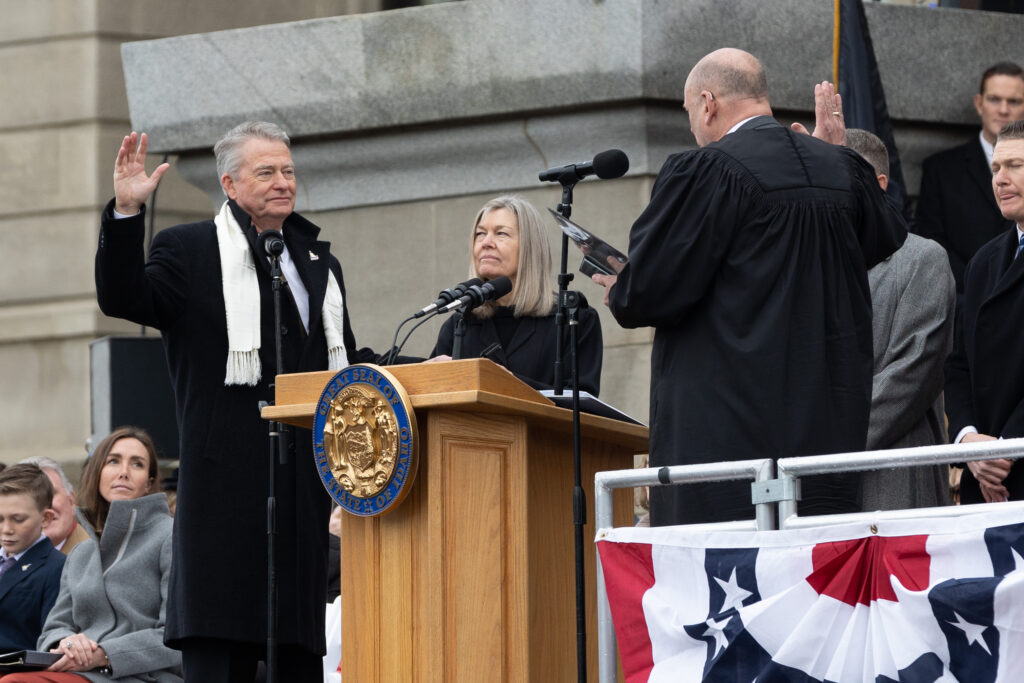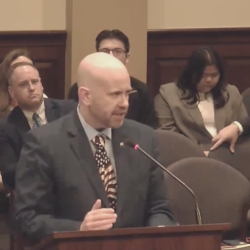According to the book Band of Brothers by Stephen Ambrose and the HBO miniseries of the same name, Lt. Dick Winters had an antagonistic relationship with his commanding officer Capt. Herbert Sobel. Sobel was responsible for preparing Company E of the 506th Parachute Infantry Regiment of the 101st Airborne Division of the US Army to participate in the D-Day invasion of France.
By all accounts, Sobel was a tough taskmaster, but he proved less than capable of leading troops in the field. Tension grew, and eventually Sobel tried to make an example of Winters by disciplining him for not obeying an order he never received. Winters requested court martial, but the incident was eventually forgotten and Sobel reassigned. Winters took command of Company E during the Normandy invasion, winning a Distinguished Service Cross for his leadership at Brécourt Manor.
He was promoted to captain, and eventually major. The miniseries dramatized a moment at the end of the war in which Sobel, still a captain, encountered Major Winters and neglected to salute. Winters reminded his former commanding officer that “we salute the rank, not the man.” Sobel saluted and went about his way.
In the heat of political battles it is easy to engage in mockery, or even maliciousness, toward our ideological opponents. However, I often remind myself that these men and women with whom I disagree nevertheless occupy positions that demand a certain level of respect. I’m sure this comes across as old fashioned to some, but I believe that Major Winters’ logic applies here as well: We respect the position, not the man.
Remember the incident in the Book of Acts when Paul was on trial before the Sanhedrin?
And looking intently at the council, Paul said, “Brothers, I have lived my life before God in all good conscience up to this day.” And the high priest Ananias commanded those who stood by him to strike him on the mouth. Then Paul said to him, “God is going to strike you, you whitewashed wall! Are you sitting to judge me according to the law, and yet contrary to the law you order me to be struck?” Those who stood by said, “Would you revile God’s high priest?” And Paul said, “I did not know, brothers, that he was the high priest, for it is written, ‘You shall not speak evil of a ruler of your people.’”
Acts 23:1-5 ESV
The honor attached to high office can seem foreign to Americans, who proudly boast of fighting a war to not have a king. We nevertheless retain some affectations such as addressing judges as “Your Honor” and referring to members of Congress as “The Honorable so-and-so”. Clearly, there are and have always been members of Congress who were in fact quite dishonorable, but we should still respect the office in which they sit.
This concept was more easily understood by our European ancestors, who believed that kings were appointed by God. The King of England, for example, embodied his people, and thus the respect given him was symbolic of his role in representing them. However, with that respect came responsibility. Kings had no private lives to speak of. Their glories were shared with their people while their scandals were the shame of their kingdom. Even today, King Charles III has little say over his own life. Despite being a mere figurehead, he must continually act out the ceremonies that keep the English people connected to their traditions.
The respect we show elected officials in the United States is not only rooted in traditions and biblical mandates, but also in the fact that they are ultimately accountable to we the people. Expensive campaigns and mail-in ballots aside, every elected official in America must come before the voters for a referendum on his performance, like a CEO reporting to his board of directors. When an elected official enters office with a mandate of the people, then he is owed a certain amount of respect with regards to his office, even by those who did not vote for him.
Once again, however, that respect goes both ways. Elected leaders have a responsibility to listen to the people, hear their concerns, and address their grievances. They must live every moment of their lives as if they were on camera, without the comfort that relative anonymity brings a regular person. They must rise above the pettiness that is an unfortunate component of human nature. They must serve, eschewing personal gain.
Clearly, many elected officials fall short of these responsibilities, which is why we salute the rank, not the man. We can give the office its due respect while working within our republican system of government to elect leaders who are worthy of it. In the end, we get the leaders we deserve, so let us make ourselves a people worthy of honorable leadership.
You shall not revile God, nor curse a ruler of your people.
Exodus 22:28
Pay to all what is owed to them: taxes to whom taxes are owed, revenue to whom revenue is owed, respect to whom respect is owed, honor to whom honor is owed.
Romans 13:7
Feature image by Otto Kitsinger for Idaho Capital Sun.
About Brian Almon
Brian Almon is the Editor of the Gem State Chronicle. He also serves as Chairman of the District 14 Republican Party and is a trustee of the Eagle Public Library Board. He lives with his wife and five children in Eagle.













